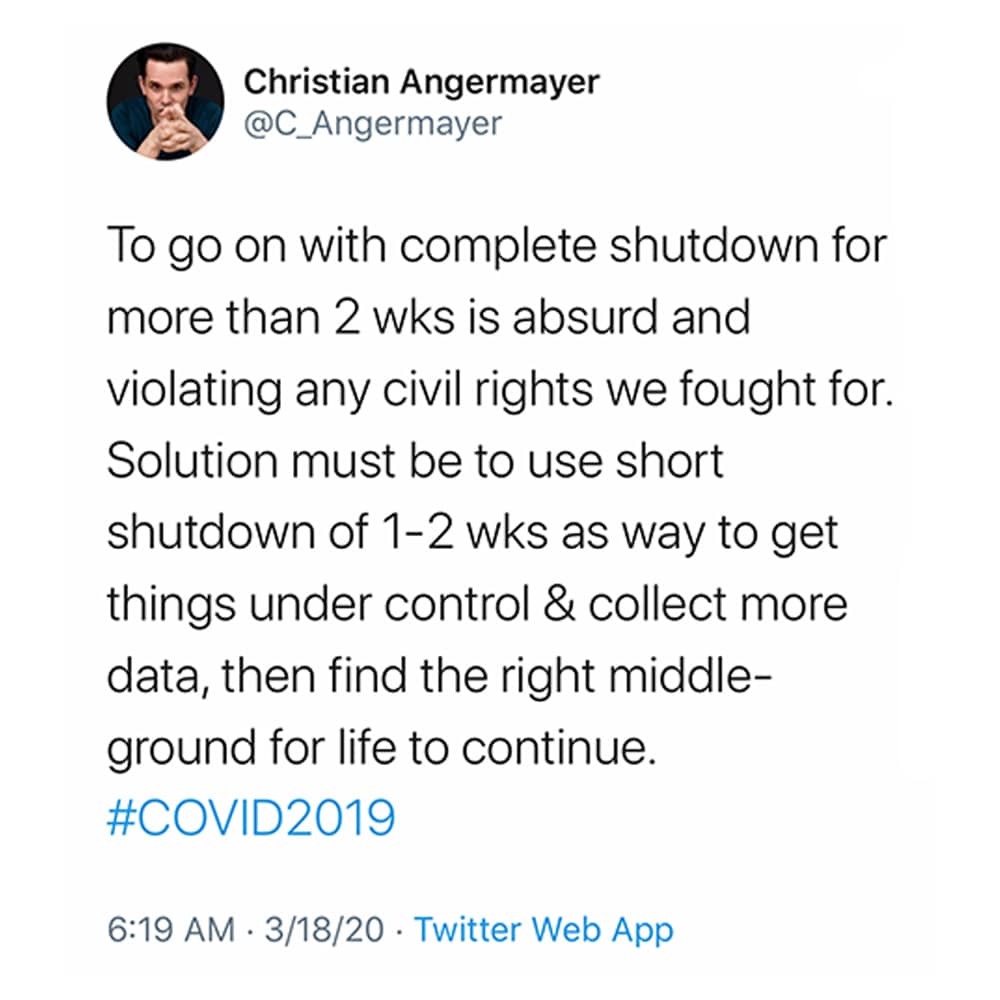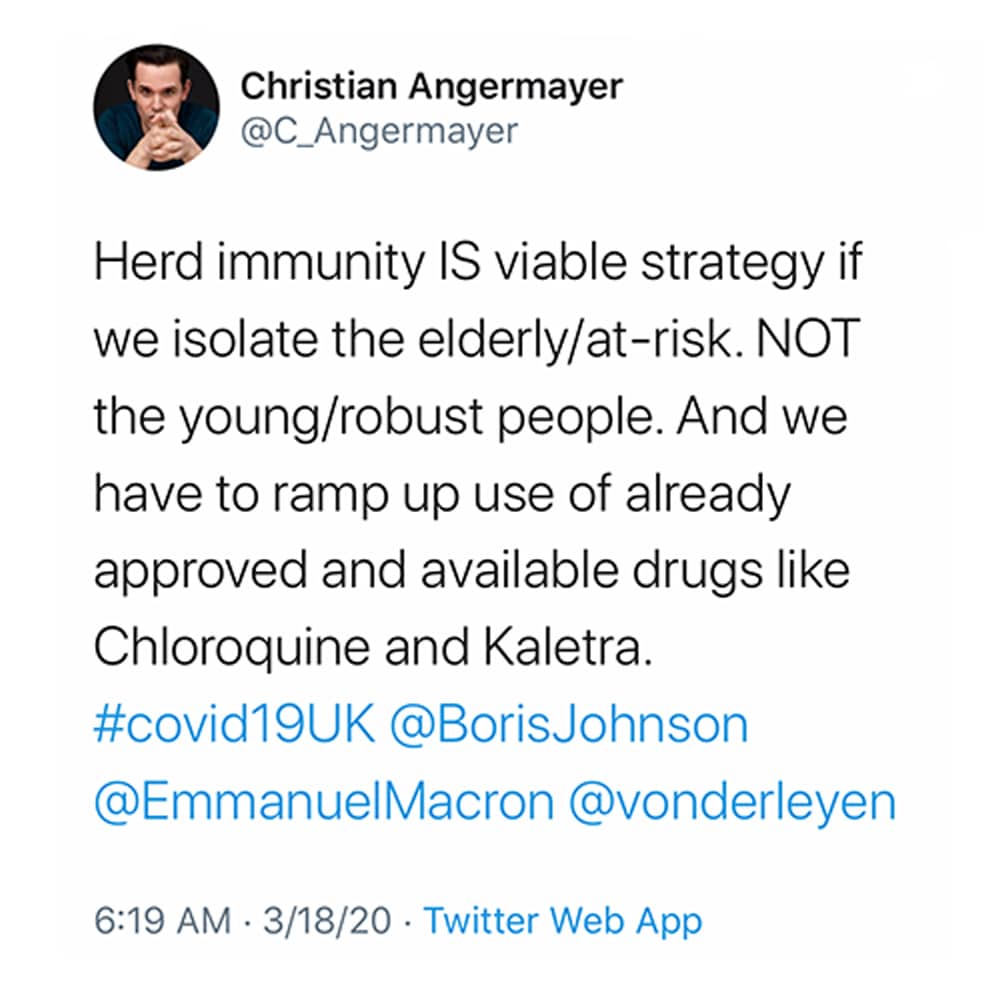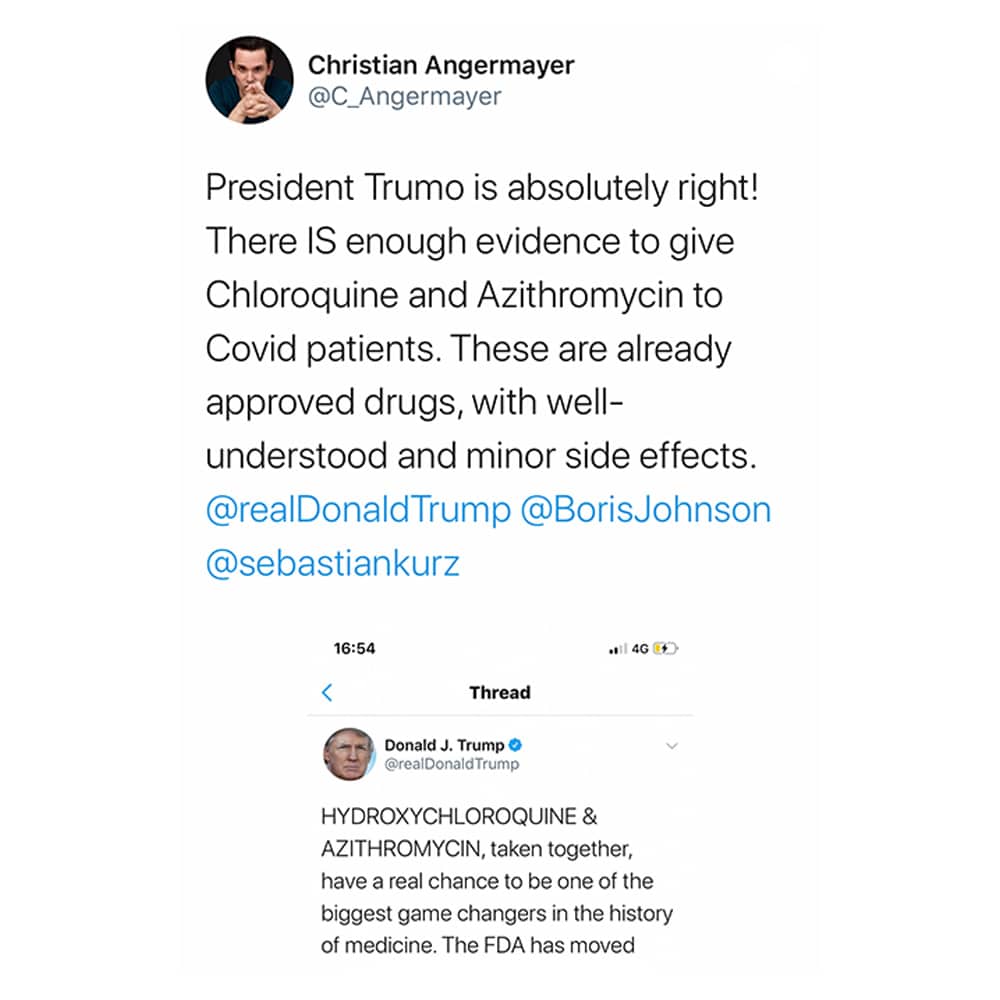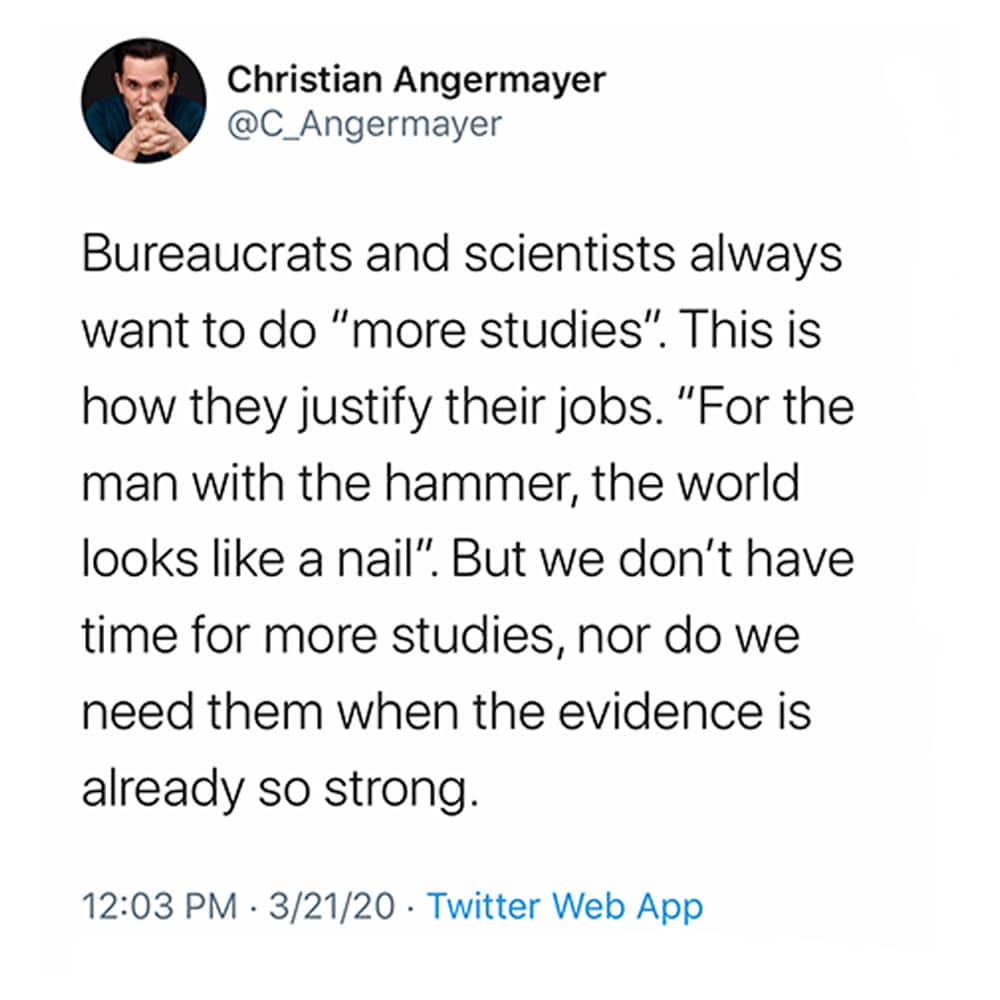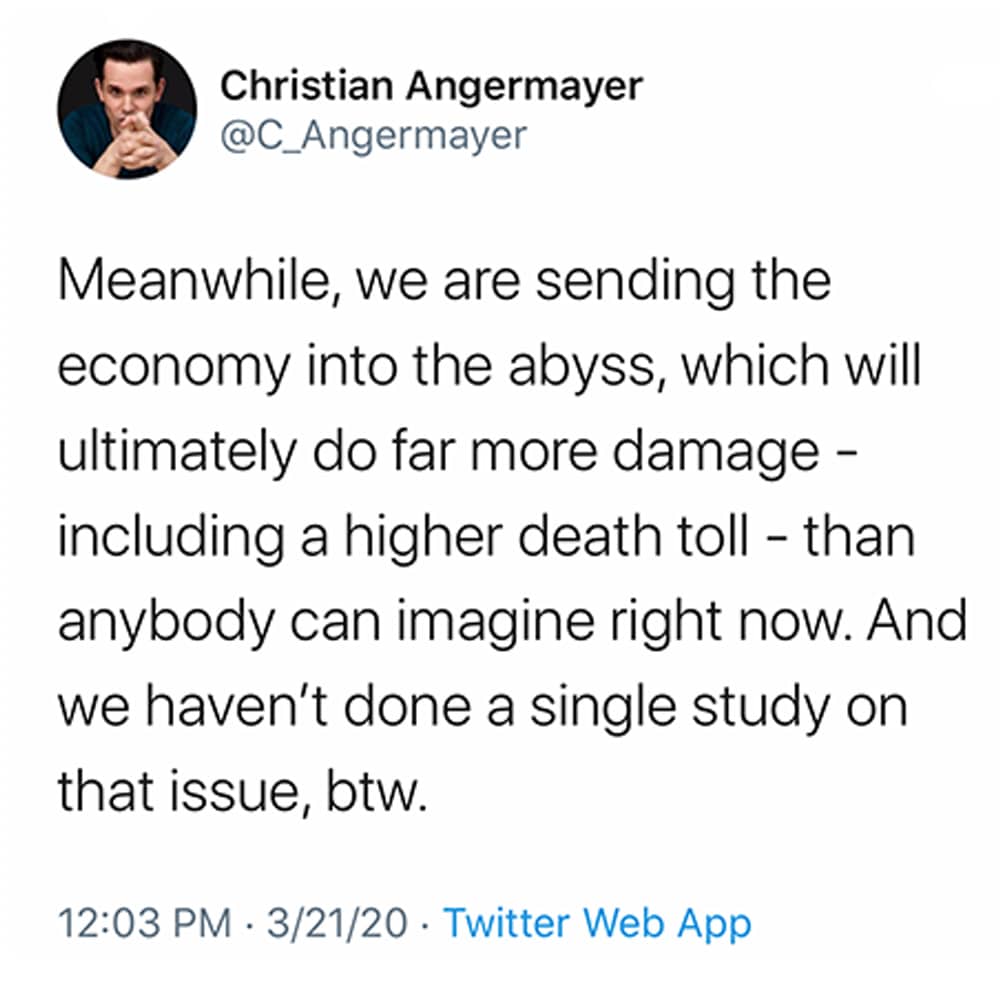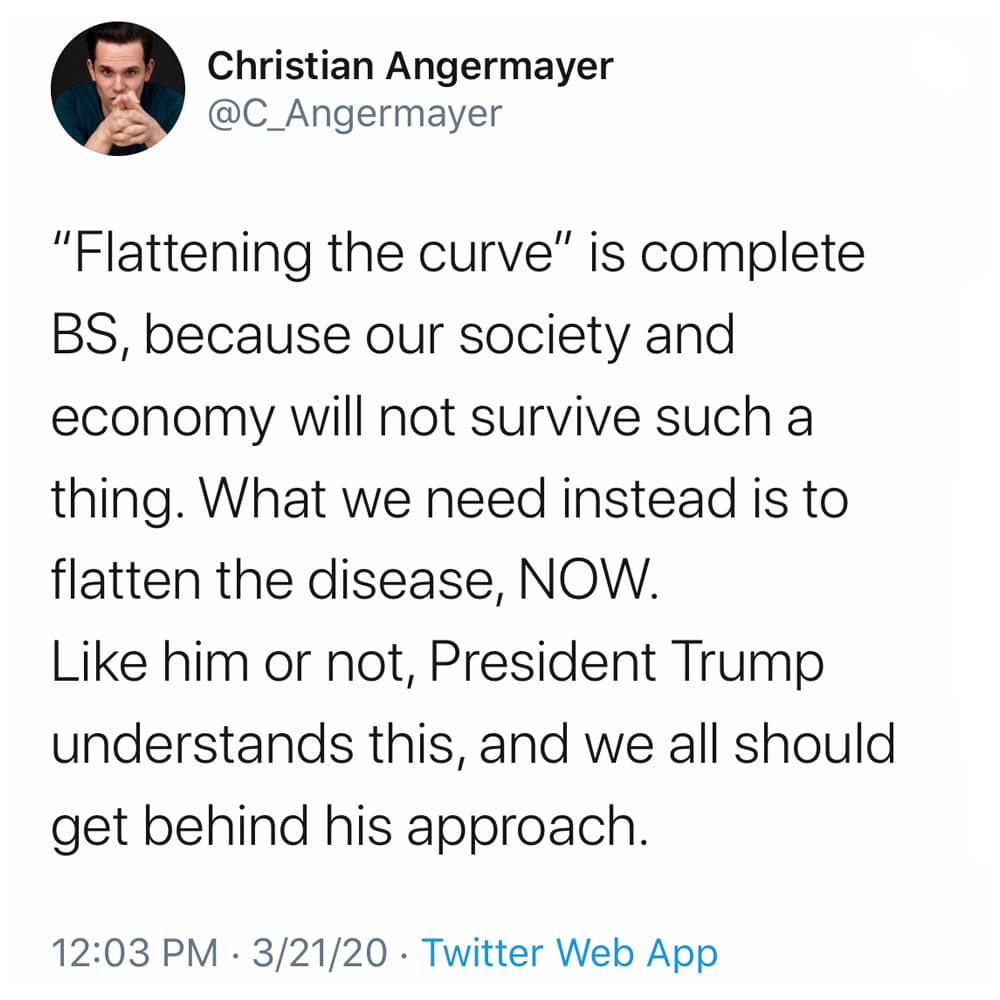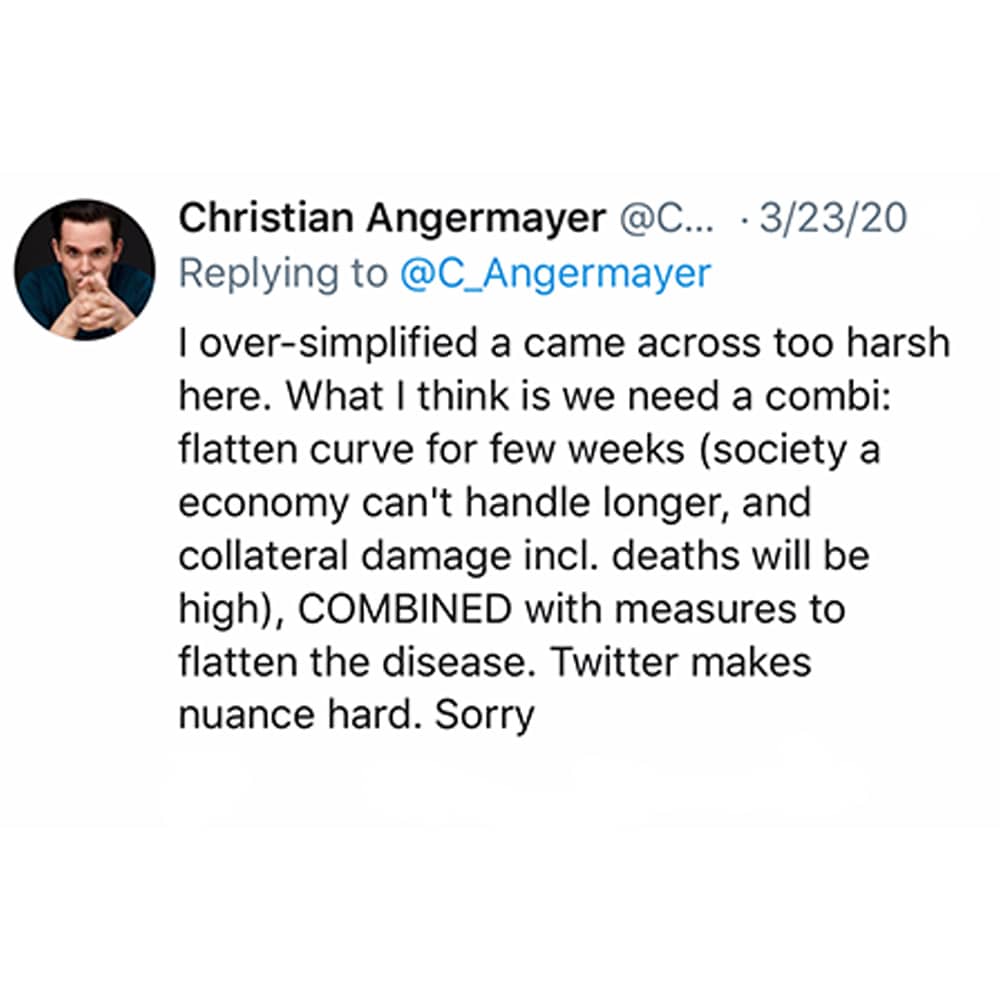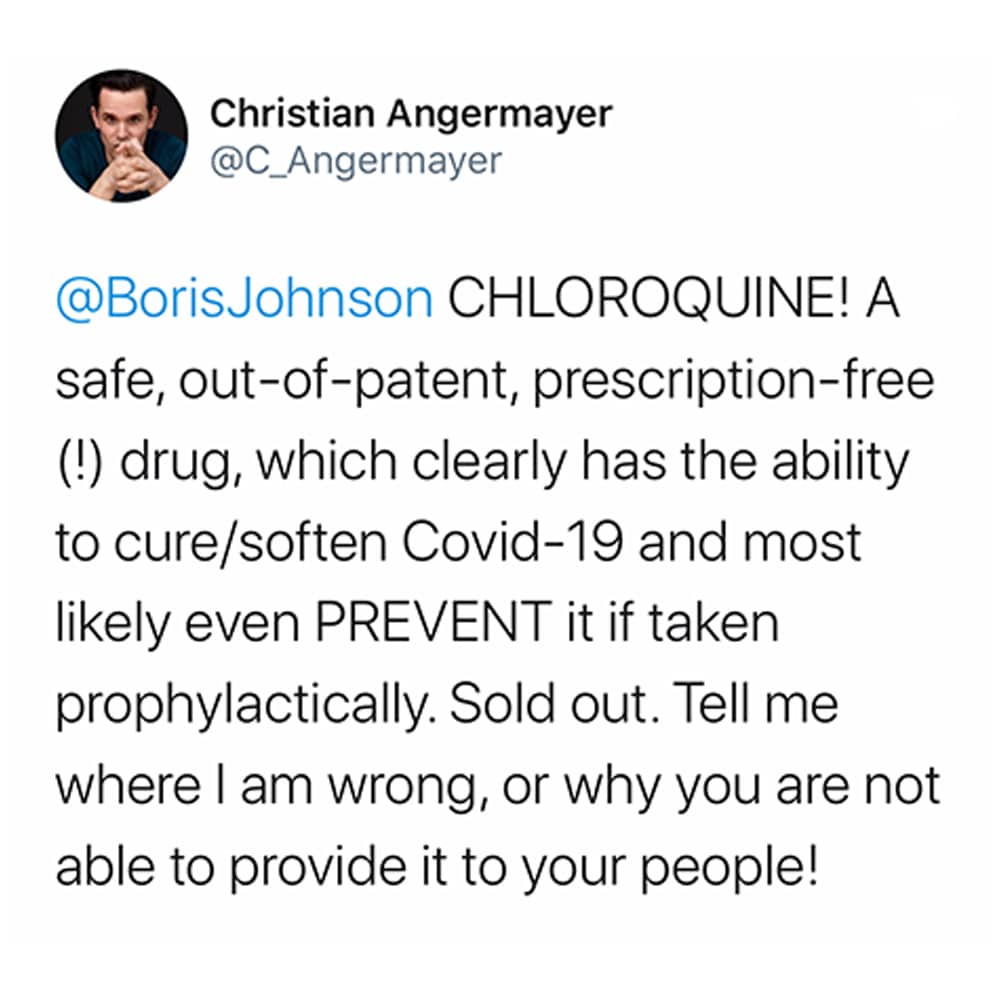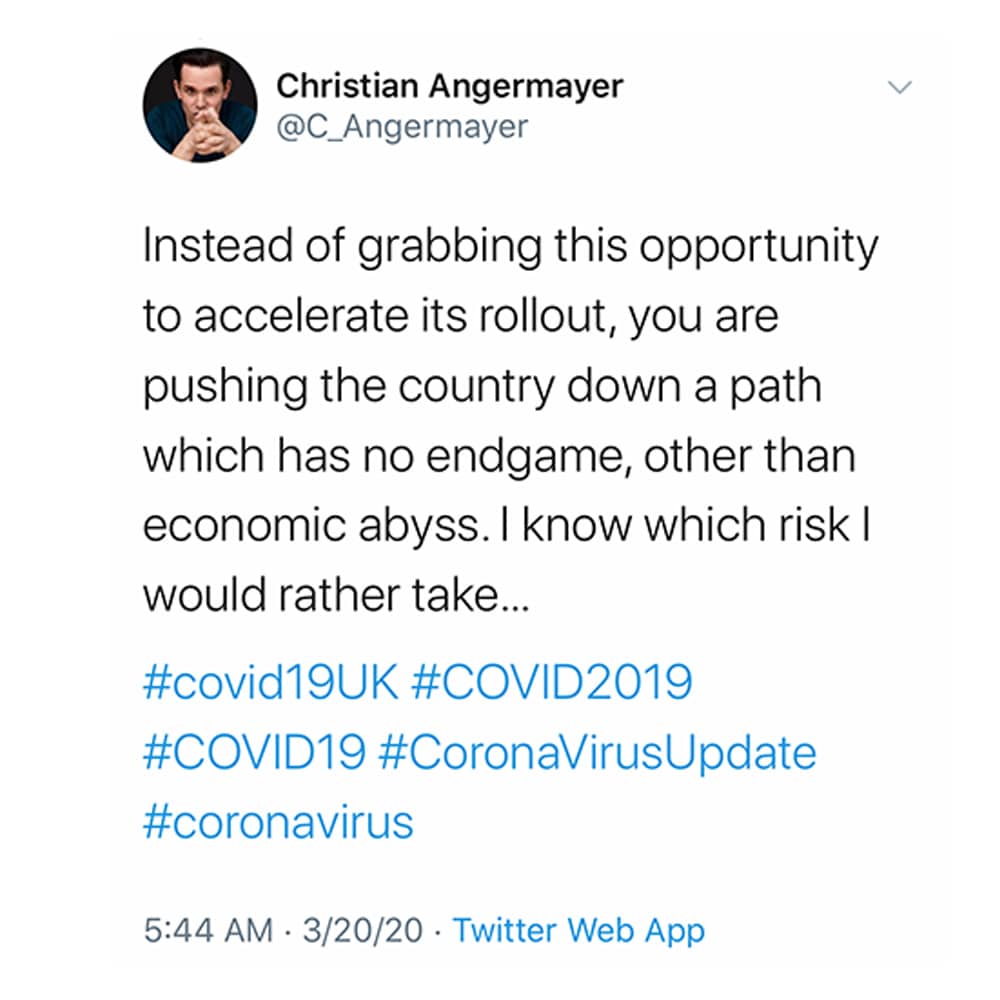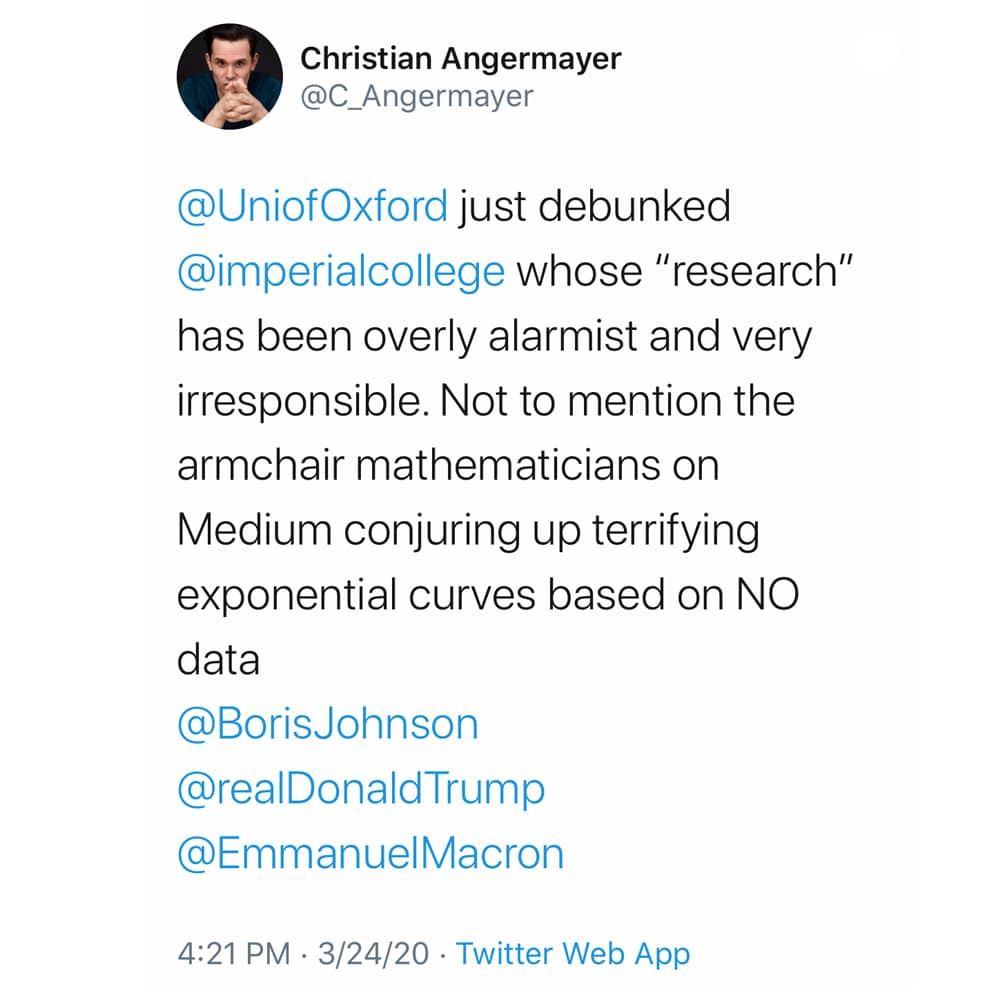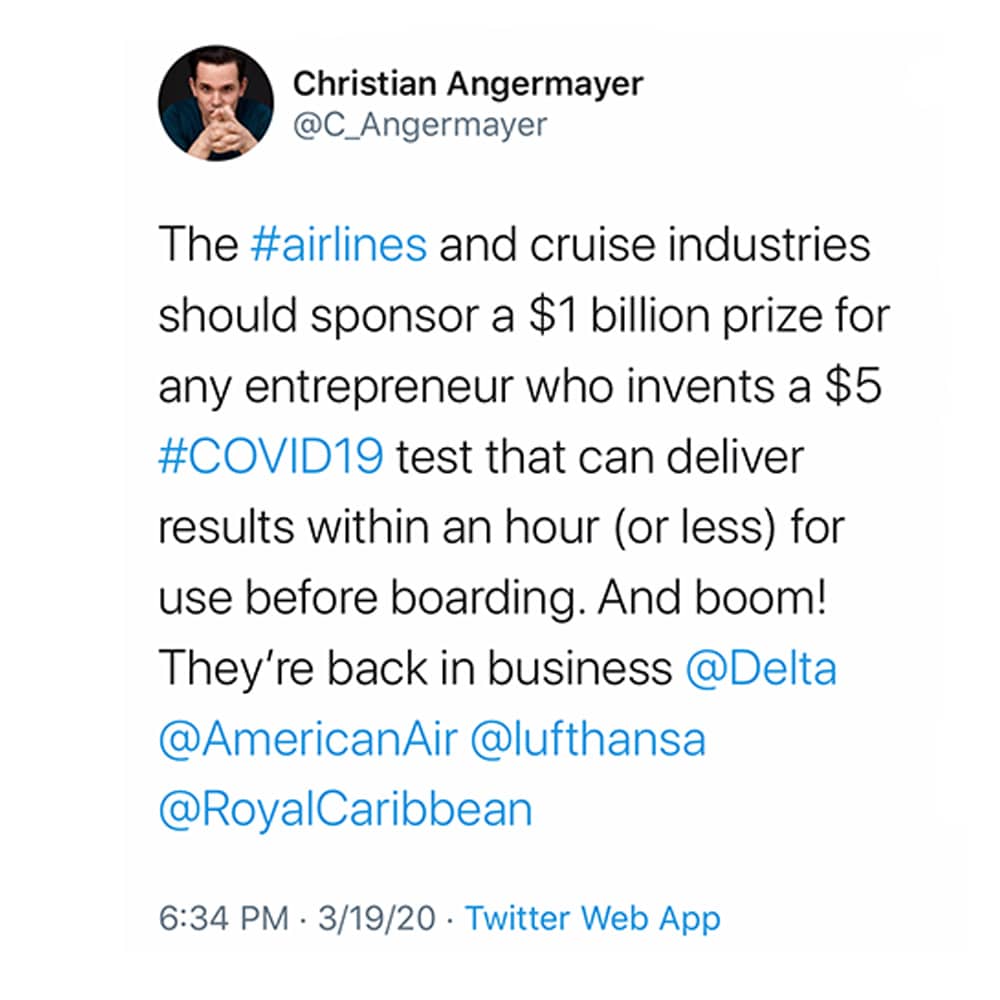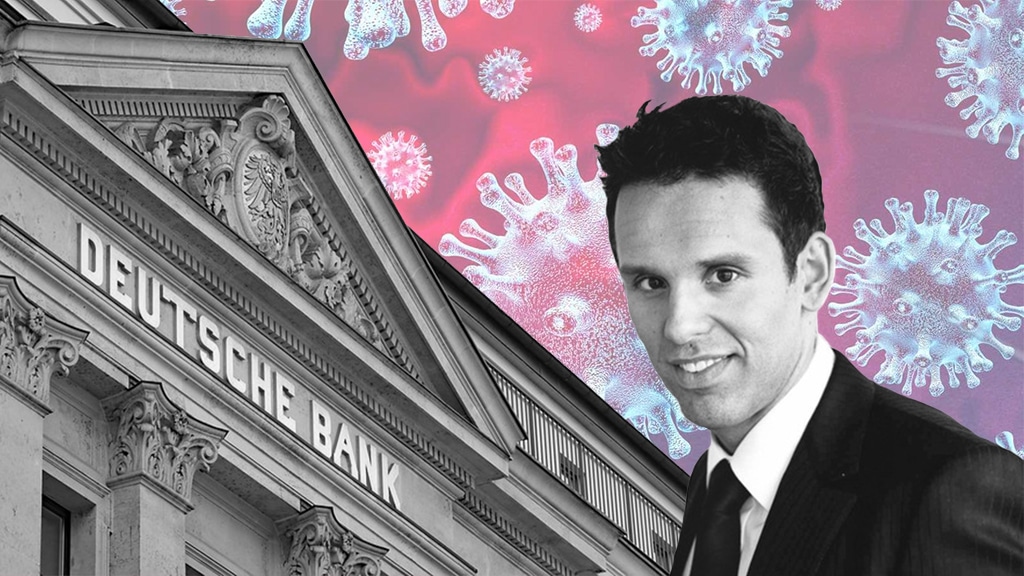
According to medical professionals, the US has yet to experience the worst of the coronavirus. Despite infectious disease expert Anthony Fauci warning that a perfect government response could see 200,000 Americans die before the virus runs its course, President Trump has prodded Americans to return to work, even as industries demand federal bailouts and counties abandon containing—or, in some cases, even testing for—coronavirus. In this moment of collective fear and uncertainty, we have been offered a glimpse into the scientific, political, and economic ideologies of Christian Angermayer, who is currently the largest institutional investor in for-profit psychedelic pharmaceuticals and “wellness.”
[This is part 1 of a 3-part series. Click here to read part 2. Click here to read part 3.]
As each day becomes deadlier than the last, Trump cribs from FOX News, proclaiming, “We can’t have the cure be worse than the problem” (read: public health is less important than “economic health”). Trump has gone from claiming that the virus will soon drop “close to zero” to berating reporters who ask him what messages he has to offer a scared public. To be fair, the cure might be worse than the disease—but only if measured by the bank accounts of the ultrarich.
Meanwhile, on Twitter, ATAI Life Sciences’ founder and COMPASS Pathways investor, Christian Angermayer, echoes Trump, promoting various neoliberal approaches that prioritize abstract economies over actual human beings. For instance, he believes that, “‘Flattening the curve’ is complete BS, because our society and economy will not survive such a thing”; that Boris Johnson is “pushing the country down a path which has no endgame, other than economic abyss”; and “To go on with complete shutdown for more than 2 wks is absurd…”
His tweets range from attacks on mitigation strategies like social distancing (designed to “flatten the curve,” and save lives by preventing hospitals from being overwhelmed), to promoting widespread use of chloroquine and hydroxychloroquine while ignoring their dangerous and potentially deadly side effects in some patients, to suggesting that airlines and cruise industries get back in business by sponsoring a $1 billion prize for coronavirus test kits.
Angermayer’s counterfactual claims are consistent with his creative relationship with reality. In dozens of biographies strewn across the internet, Angermayer identifies himself as co-founder of a German biotech company called Ribopharma. However, according to Ribopharma co-founder Roland Kreutzer, Angermayer was hired to provide “managerial expertise” and “served as a member of our supervisory board.” Kreutzer elaborated, “It is, however, not correct that Christian was a co-founder of Ribopharma.”
Ultimately, Ribopharma merged with Alnylam Pharmaceuticals, which went public in 2004. According to Angermayer, this was his “first liquidity event,” after which he waded deeper into the world of global finance. He wound up getting involved in at least one questionable banking deal (based on his belief that “Africa would be one of the most important ‘megatrends’ for the next few decades”), created Apeiron Investment Group, a Malta-based “merchant banking” business, and founded ATAI Life Sciences, a German-based biotech company with a stated mission to “cure mental health disorders” and unleash what Angermayer calls a “virgin market of for-profit psychedelic research.”
As with his Ribopharma claims, Angermayer’s story about his experience with psilocybin raises questions. As we previously reported, Angermayer has told some media outlets that his mushroom experience took place “in nature” in the Netherlands, while telling others the experience took place on a yacht in “tropical waters,” stressing, “Make sure you make it clear that it’s legal in the Caribbean.” His insistence on the legality of his own experience fits conveniently with his position that psychedelics should only be accessible through the types of medicalized clinics his companies plan to operate.
Angermayer’s interest in psychedelic medicalization led him to invest in the psilocybin startup COMPASS Pathways, alongside venture capitalist and far-right, tech robber baron Peter Thiel (of surveillance capitalist Palantir and Clearview AI infamy). COMPASS Pathways has used intellectual property schemes (like dubious patents and exclusivity agreements with psilocybin manufacturers) in an unprecedented effort to interfere with psychedelic research by non-profit companies and research universities.
At the Psychedelics: Mind-Enhancing Methods to Well-Being panel, Angermayer spoke alongside self-help guru Tim Ferris, Imperial College psychedelic-researcher Robin Carhart-Harris, Johns Hopkins psychedelic-researcher Matthew Johnson, and author Ayelet Waldman. This panel was held at the Milken Institute, named for the recently (questionably) pardoned Michael Milken, the notorious father of “junk bonds.” Championing his Libertarian free-market ideologies, Angermayer contributed to this event by framing the mental health demand for psychedelic-assisted psychotherapy in economic terms of scale: “The market is growing, for better or for worse.”
Angermayer’s views on addressing the coronavirus pandemic are consistent with his economic worldview, which—given his interest in psychedelic pharmaceuticals—is worth further exploration. In addition to being a board member of the market-fundamentalist Hayek Institute think tank, he appears to have a penchant for the type of demonstrably incorrect theories that economist F.A. Hayek promoted.
In his 1960 work, The Constitution of Liberty, Hayek argued, if prices double “between 1960 and 1980…most of those who retire at the end of the [twentieth] century will be dependent on the charity of the younger generation.” Hayek suggested that rather than seeing social safety nets, we would see “concentration camps for the aged unable to maintain themselves.” The real world examples of Switzerland, Scandinavian countries, and countries on the Pacific Rim evidence the absurdity of such statements.
Creative readings of Hayek’s views on centrally-planned economies appear to have laid the foundations for conservative hysteria about government-insurance-mandated “death panels.” Conservative commentators like Glenn Beck—who repopularized Hayek with the Tea Party in 2010—hyperventilated over fictitious Obamacare executions. However, in the face of the deadly realities of COVID-19, Beck is now saying, “I would rather have my children stay home and all of us who are over fifty go in and keep this economy going, and working, even if we all get sick. I would rather die than kill the country.” As Atlantic writer Adam Serwer noted, “When they say they’re willing to die for the economy, what they really mean is they’re willing to let you die for the economy.”
Angermayer and those asserting, “the cure can’t be worse than the disease,” are eager to endanger elderly and immunocompromised people (at the very least) in service to capitalism and mindless consumption. Hayek’s disciples have railed against the supposedly murderous fallout of solidarity and mutual aid for years. Now they actively promote homicidal outcomes as economic dictates. We are observing what Jacobin author Peter Frase called “The Rise of the Party of Death,” in real time.
I dealt with suicidal cults before. I encountered people who are willing to die for their faith, ideology, race, etc. But, I never encountered anyone who is willing to die for someone else’s 401k. This is a whole new level of craziness. https://t.co/68PeKqMr2x
— Ali H. Soufan (@Ali_H_Soufan) March 24, 2020
In multiple tweets, Angermayer calls for limiting social isolation to periods of time that defy medical professionals and available scientific data. He’s attacked Neil Ferguson, Imperial College London epidemiologist, while fundamentally disregarding the concept of flattening the curve. On April 2nd, 15 days after Angermayer called for social distancing to be lifted in 7-14 days, global cases topped 1 million (a ~350% increase from the 18th). In that same period, the US became the global leader in confirmed coronavirus cases by country.
Since numerous real-world examples have demonstrated the absurdity of his suggestions, why is Angermayer calling for approaches that jeopardize public health? He is explicit: Angermayer is worried about economic damage. (For more on his specific comments, please see Flattening The Curve is Complete BS”: Pandemic Advice From Psychedelic Investor Christian Angermayer)
Angermayer isn’t just calling for obscenely short periods of isolation that kill more people; he’s also urging for widespread use of chloroquine and hydroxychloroquine, drugs which his AI company, Innoplexus, has promoted in a recent press release. These anti-malarial medications—also used to treat lupus and rheumatoid arthritis—regained attention after Trump made the false claim they had been approved by the FDA for COVID-19. Since Trump’s claims, anecdotal data has led to the FDA granting “compassionate use” and then emergency approval for both drugs. Angermayer is not presenting the type of anti-expert, anti-science perspectives of QAnoners. Rather, he’s prioritizing his capitalist ideology over facts.
By repeatedly minimizing (or failing to acknowledge) the potentially negative side effects of chloroquine and hydroxychloroquine (such as convulsions, liver and kidney dysfunction, cardiac complications, and death) Angermayer reveals the gamble he’s willing to take with other people’s lives. Biotech executives should have some sense of basic healthcare practices, especially if they’re going to publicly advocate widespread use of a particular medication. Angermayer’s fixation on economic fallout reveals the views of a millionaire whose daily reality runs on a fundamentally different operating system than the vast majority of humanity.
Amidst COVID-19, the idea that we must prioritize “economic health” over public health ignores the reality that, under late stage capitalism, “economic health” is actually code for elite prosperity, which does not translate into greater individual or societal health.
Even in the face of market collapse, most of us are capable of organizing with others through acts of solidarity and mutual aid in order to survive. It’s the structures of capitalism—the status quo that created the conditions for this pandemic and has been unable to address the fallout—that have interfered with our ability to do this in pre-pandemic daily life. This recognition is actively catalyzing international calls for mutual aid, including rent strikes, open housing, and healthcare.
COVID-19 is not “the great equalizer,” nor is it blind to “race, class, or gender.” These sentiments overlook the stratified nature of the society in which we live. In addition to the elderly and the immunocompromised, those on the frontlines (working in “essential services” such as healthcare, food service, or delivery) are at greatest risk for contracting the virus, along with prisoners, unhoused people, victims/survivors of domestic abuse (or anyone else living in shelters), and other groups already marginalized within capitalism.
But capitalism doesn’t deserve life support—especially not under these circumstances. A pandemic like coronavirus was inevitable. The Obama administration briefed the incoming Trump administration on the likelihood of a pandemic in 2017, while Wilbur Ross napped. Angermayer’s spirited defense and admiration of President Trump is especially disturbing given that Trump has repeatedly discounted the seriousness of coronavirus, lied and spread misinformation, failed to take decisive and meaningful action, and ultimately jeopardized the health and well-being of countless people throughout this crisis.
In the 1980’s, British Prime Minister Margaret Thatcher was fond of saying “There is no alternative” to capitalism and market economics, while actively crushing attempts to create those very alternatives. In the face of coronavirus—and other inevitable crises—as elites call upon us to sacrifice ourselves to keep their economies alive, they maintain that there is no alternative. If we wish to experience an alternative, we must recognize that another world is possible.
Hey! Before you go… Psymposia is a 501(c)(3) non-profit media organization that offers critical perspectives on drugs, politics, and culture. We strive to ask challenging questions, and we’re committed to independent reporting, critical analysis, and holding those who wield power accountable.
Our perspectives are informed by critical analysis of the systemic crises of capitalism that have directly contributed to the unmitigated growth of addiction, depression, suicide, and the unraveling of our social relations. The same economic elite and powerful corporate interests who have profited from causing these problems are now proposing “solutions”—solutions which both line their pockets and mask the necessity of structural change.
In order for us to keep unpacking these issues and informing our audience, we need your continuing support. You can sustain Psymposia by becoming a supporter for as little as $2 a month.
Plus Three
The Plus Three podcast is Psymposia co-founder Brian Normand, Medicine, Society and Culture Editor, Nese Devenot, Politics and Ecology Editor, Brian Pace, and Managing Editor, David Nickles. Plus Three goes deep into the world of drugs, from local decriminalization and emerging psychedelic corporations to leftist politics and mass incarceration. Each week the team and guests attempt to make sense of the complex connections between drugs, science, capitalism, policy, and culture.
